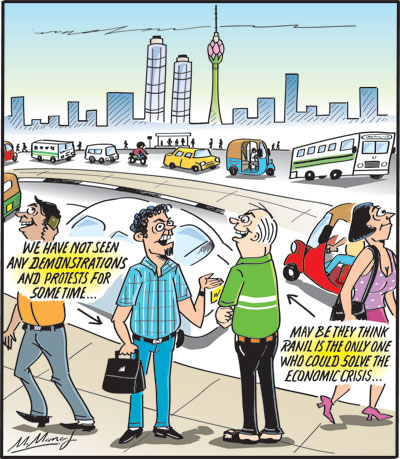Columns
The economy in a period of lesser discontent and socio-political unrest
View(s):There is a lull in the country’s political protests and social unrest. The spate of trade union strikes, protests and social unrest appears to have died down, despite the high costs of living, increasing unemployment and poverty.
Reconciled
People appear to have accepted the prevailing economic conditions. Perhaps, the availability of essential consumer items and the reduction in prices of some have led to an expectation of better times. Perhaps, they have expectations of an improvement in their living conditions. Whatever the reasons, this period of normalcy is conducive to a resurgence of the economy. Yet, while peace is a necessary condition, it is not sufficient for an economic revival.
Inflation
The deceleration of the rate of increase in inflation, the availability of essential items and the reduction of prices, the hope of further reductions of prices, the appreciation of the rupee, and the news of foreign assistance may have reduced the discontent and reconciled people to economic difficulties. Expectations of an improvement in living conditions may have led to less discontent.
Normalcy
Whatever the reasons, this period of normalcy is conducive to the resuscitation of the economy. The wheels of the industry may run somewhat better.
Party politics
Nevertheless, it is a period of heightened political activity and realignment of party affiliations, the formation of new parties and new fronts to forge a new regime. The final outcome of these political moves of politicians and parties is unclear now.
Elections
Uncertainty prevails over which election will be held first and when elections will be held. However, the ongoing negotiations and new party formations have probably led to the respite in protests.
 Economy
Economy
In as far as the economy is concerned, there is a degree of optimism that better days are ahead. However, as we have pointed out in previous columns, the economy is not at a stage of recovery. In fact, it is continuing to contract. Unemployment and poverty are increasing.
External finances
Other than growth in tourism and an improvement in the external finances owing to higher inward remittance and tourist earnings, all other economic activities remain at low levels of production.
Bright spots
The two bright spots in the economy are increased inward remittances and earnings from tourism. These two are likely to bring in around US$ 11 billion this year and minimise the trade deficit. A balance of payments surplus of about US$ 4 billion is not unlikely.
Surplus
In the first four months of the year, there was a balance of payments surplus, despite a higher trade deficit. A balance of payments surplus of about US$ 4 billion is likely at the end of this year in spite of the trade deficit widening. This could be higher if foreign assistance and project loans flow in.
Trade deficit
Although a favourable outcome in the external finances is likely this year, the trade deficit is of serious economic impact. The decrease in exports has led to the closure of several factories and about 150,000 people have lost their jobs. This has increased poverty and malnutrition.
Global recession
While the global recession, and especially the recession in Western countries, is the main reason for this, the high cost of production has also been a significant reason for a decrease in exports.
Export demand
There is no immediate prospect of a revival of export demand. The consequent high unemployment, reduced incomes and increased poverty are serious concerns.
SMIs
There is, however, a prospect of a revival of small and medium industries (SMIs) with a likely import of raw materials with the liberalisation of imports enabled by the improvement of external finances. This may relieve the unemployment problem to some extent.
An often-forgotten factor is that the increased inflow of remittances would improve incomes. However, it is not clear whether remittances have increased or whether the official amount has increased due to a diversion from informal sources.
Foreign assistance
There is a new wave of optimism in receiving foreign assistance after the President’s recent visit to Japan. In any event, the more peaceful political conditions are conducive to an economic revival.
Concluding reflections
The spate of strikes, political protests, social unrest and discontent of recent months have not been conducive to the functioning of the economy and an economic revival.
Political stability and law and order are vital to achieve economic growth.
The current relatively quiet political and social conditions could be due to an improvement in living conditions and expectations of further improvements.
It may also be an interim period when conditions are not conducive to political protests as various changes are being worked out by individuals and political parties in preparation for elections that are expected at the end of the year. Whether this would be a Presidential election or a parliamentary one is anybody’s guess.
As far as the economy is concerned, although the external finances of the country are improving, exports are declining, unemployment is increasing and prospects of economic recovery remain bleak.
On the other hand, an improvement in the external reserves is likely to permit a liberalisation of imports and enhance the availability of goods, and improve services.
Buying or selling electronics has never been easier with the help of Hitad.lk! We, at Hitad.lk, hear your needs and endeavour to provide you with the perfect listings of electronics; because we have listings for nearly anything! Search for your favourite electronic items for sale on Hitad.lk today!


Leave a Reply
Post Comment